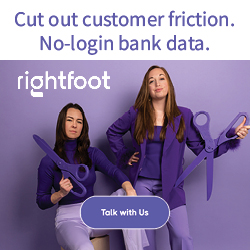ChatGPT Makes it Debut in The Secured Finance Market
 “Based on the balance sheet provided, the business appears to have a healthy financial position,” the report states. This is the opening line of the written Financial Health Analysis conducted by OpenAI’s ChatGPT. From there it elaborates at length with all the relevant financial stats that an underwriter could ever dream of, even going so far as to recommend all on its own that recent tax returns, among other stips, should be requested to move forward.
“Based on the balance sheet provided, the business appears to have a healthy financial position,” the report states. This is the opening line of the written Financial Health Analysis conducted by OpenAI’s ChatGPT. From there it elaborates at length with all the relevant financial stats that an underwriter could ever dream of, even going so far as to recommend all on its own that recent tax returns, among other stips, should be requested to move forward.
What the world is coming to know as a chatbot, is capable of much, much more, according to Dave Kim, co-founder and CEO of Harbr, Inc. Harbr’s flagship product, IntakeIQ, is taking online application technology to new advanced places thanks to the introduction of real artificial intelligence. But there’s a right and wrong way to do this because keeping applicant information anonymous and secure is paramount.
“…security is massive, right?” said Kim. “Like you have to know going in that if you’re going to use a GPT or a Large Language Model that’s being hosted and you don’t have control of it yourself, that the data is 100% being used for machine learning.”
And along with security is the science of data input. Roughly speaking, the more information you send to ChatGPT the more it costs to spit out an answer. That means data not only needs to be secure but condensed down to such compact bits of input that the cost is acceptable and scalable. This is no domain for amateurs who think they can accomplish this with a basic monthly ChatGPT subscription. And Kim is no amateur.
“My background is in enterprise software development,” Kim said. A previous company he co-founded, GoInstant, was acquired by Salesforce for $70 million in 2012. Kim was already developing AI-driven technologies long before ChatGPT became known to the world, more recently in the commercial construction business. The aspect of invoices and payments combined with OCR technology soon evolved into a separate use-case where it could be used in financing like factoring and more. But their tech had to understand the niche particulars of the information it was analyzing.
“So we essentially started training a natural language processing model using machine learning techniques around those sorts of phrases and terminology for the construction industry,” said Kim. “So we were building that kind of tech first and then it became relatively easier when dealing with broader information in documents and other invoices that were coming in for not just construction.”
In 2022, Kim first encountered the capabilities of ChatGPT. He said that while the AI is great at creating a diversity of answers, the way they engineered their prompts with financial data produced consistent output. That’s what’s key. Harbr’s technology does a lot of the work on its own side first before sending off a highly secure, highly redacted, anonymized and reduction-optimized prompt to ChatGPT. The process can start with a pdf statement because it’s automatically OCR’d and analyzed first before any of this happens. Harbr isn’t able to view or retain any of the data and ChatGPT does not know anything identifiable about the applicant. Only the lending company is privy to the applicant’s info and the results. Setting this up for a lender can be accomplished very quickly.
The object isn’t to entirely replace underwriting, but to make it more efficient.
“Today we work with businesses that are in asset based lending, factoring, supply chain finance,” Kim said. “We’re starting to look at equipment, transportation, equipment financing and leasing. […] I think the entire secured finance market, there’s a fit here as the technology grows.”
Last modified: June 2, 2023Sean Murray is the President and Chief Editor of deBanked and the founder of the Broker Fair Conference. Connect with me on LinkedIn or follow me on twitter. You can view all future deBanked events here.































